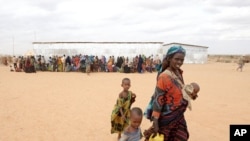The United States has announced $127 million in additional funding for nutrition and drought alleviation programs in Ethiopia. USAID chief Rajiv Shah made the announcement during the first of two stops in the drought-stricken Horn of Africa.
USAID administrator Shah met Ethiopian Prime Minister Meles Zenawi Tuesday to discuss ways of breaking the cycle of drought and malnutrition that regularly claims uncounted thousands of lives in East Africa. He came with three new aid grants, including $110 million for a food security program aimed at reaching 1.5 million Ethiopians suffering from chronic hunger conditions.
Of the estimated 12.4 million people suffering from malnutrition in the region, the largest number are in Ethiopia, Africa’s second most populous nation.
Ethiopia is credited with taking preventive measures since the last horrific drought in 2008, which claimed tens of thousands of lives. A network of new health centers has been constructed, providing a first line of defense to identify severe malnutrition cases that would have been fatal three years ago.
With those measures in place, Shah said his talks with Prime Minister Meles focused on further steps Ethiopia could take to increase drought resiliency.
"We discussed some very specific policy reforms that the prime minister has taken leadership on, with respect to the seed sector, with respect to marketing systems, and with respect to prioritizing pastoralism and pastoral communities and making water more available to farmers, and we believe those policy reforms will help usher in a new era of agricultural growth and performance in Ethiopia," he said.
The USAID chief said the other aid programs for Ethiopia include a new $7.3 million loan facility that will allow more private investment by farmers and agriculture-related businesses.
"Ethiopia can have more private investment in agriculture and through that private investment, more agriculture growth and the ability to avoid what we know is a recurring cycle of drought and asset destruction and increased suffering from that. We’re excited to make those commitments," Shah said. "It’s part of [the] 'Feed the Future' [program] and the reason I’m here is to make sure that those investments are aligned with policy reforms that the prime minister is putting in place to enable Ethiopia’s agriculture sector to flourish."
Feed the Future is a U.S. government initiative targeting 20 countries, aimed at alleviating the causes of hunger, and reducing poverty, hunger, and undernutrition. A USAID news release called addressing undernutrition the key to President Barack Obama’s Global Health Initiative.
The United States has provided more than $640 million in assistance in response to the Horn of Africa nutrition crisis, making it the largest single aid donor. But the latest grants come at the same time as word that the budget crisis in Washington is forcing significant foreign aid cuts. A report in Tuesday’s New York Times said both houses of Congress are proposing reductions that would affect aid programs.
Shah wraps up his East Africa visit Wednesday with a stop in Kenya, which has also been hit hard by the Horn of Africa drought.
The USAID chief will not visit Somalia, where famine has been declared in some areas controlled by al-Qaeda-linked extremists. But he is slated to meet with humanitarian groups attempting to coordinate emergency aid deliveries in the famine zone.
USAID Gives Additional Funding For Ethiopia Drought Relief




